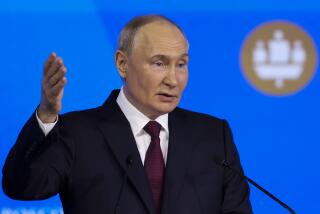Russian buildup in Syria no threat to Israel, Putin tells Netanyahu
Reporting from Moscow — Russian President Vladimir Putin tried Monday to calm Israeli fears that the Kremlin’s military buildup in Syria could expose Israel to more hostility, assuring visiting Prime Minister Benjamin Netanyahu that the Syrian government has its hands full fighting its civil war.
“We know that the Syrian army and Syria as a whole are in such a state that they have no time for a second front. They need to save their own state,” Putin told Netanyahu at the start of their meeting as television cameras rolled. “But still, I understand your concerns.”
Russia has reportedly beefed up forces and armaments at an airfield in Syria’s Latakia province and flown in reinforcements for its naval base in Tartus, the only Kremlin military installation on the Mediterranean Sea.
The moves have been read by Western intelligence officials as preparation for backing up Syrian President Bashar Assad and his forces in battling rebel militias and foreign fighters with Islamic State and other militant Islamist groups.
Russian Foreign Minister Sergei Lavrov has repeatedly insisted that the Russian troops in Syria are there -- and have been for years -- to train and assist the Syrian armed forces in the use and maintenance of armaments supplied to Damascus under long-existing and legal trade contracts.
As Assad’s forces have been driven out of much of northern and eastern Syria, however, the United States and its European and Middle Eastern allies have become concerned that Putin may be preparing to directly intervene to ensure Assad’s forces prevail in the fighting that has consumed Syria for 4 1/2 years.
Veteran Russian defense analyst Pavel Felgenhauer said in an interview Monday that such speculation was nonsense, that if Putin wanted to win the war for Assad he’d be sending in 100,000 troops, not the 500 or so now said to be deployed in Syria.
Netanyahu said he flew to Russia to express his concern about the expanding Kremlin presence in Syria providing an opportunity for Hezbollah, the Lebanon-based militant group, to turn its attention from fighting on behalf of Assad to escalating artillery attacks on the Israeli-controlled Golan Heights.
The Israeli leader said he wanted to be reassured that the result of the Russian buildup wouldn’t be to open a second front with Hezbollah and its Iranian patrons over Golan, which Israel seized from Syria in the 1967 Middle East War.
“Our policy is to do everything to stop weapons from being sent to Hezbollah,” Netanyahu told Putin in front of the cameras.
He reminded his Kremlin host that Israel is prepared to put down any threats from Syria on the Golan, in a veiled warning to Moscow to keep Russian forces away from the border.
Russia and Israel have agreed to “a mechanism to prevent such misunderstandings,” Netanyahu told Israeli journalists after his meeting with Putin, according to Haaretz and other media.
Meanwhile, the Russian military began flying reconnaissance drones above Syria over the weekend as part of the buildup that included more fighter jets, tanks and other heavy equipment, according to U.S. officials, who requested anonymity because they were not authorized to speak publicly on the intelligence reports.
There are now 24 Russian attack aircraft -- Sukhoi Su-24 fighter jets and Sukhoi Su-25 -- at the airfield in northwestern Syria’s Latakia province, along with nine T-90 armored tanks and several SA-22 surface-to-air missiles, the officials said. The Russians, who have said the weaponry is strictly defensive in nature, continue to fly two cargo resupply flights a day.
“We don’t know their intent yet, but it looks like they’re preparing to carry out airstrikes,” one official said.
Putin has proposed collaboration with the United States and other Western countries in the fight against militant groups such as Islamic State, arguing that the common aim of defeating them should unite the national forces now attacking the Islamist militias piecemeal.
The Kremlin leader is attempting to use his influence with Assad to craft a strategy for ridding the Middle East of the scourge of Islamist militants, Felgenhauer said, as part of a plan to ease tensions with the West that have flared since the Kremlin invaded and annexed Ukraine’s Crimea peninsula in March 2014.
Times staff writer W.J. Hennigan in Washington contributed to this report.
Follow @cjwilliamslat for the latest international news 24/7.
ALSO
In Greece, ex-premier’s Syriza party wins election
Tight-knit no more? Refugee crisis threatens EU ideal of unity
Europeans struggle with refugees ahead of key meetings this week
More to Read
Sign up for Essential California
The most important California stories and recommendations in your inbox every morning.
You may occasionally receive promotional content from the Los Angeles Times.











